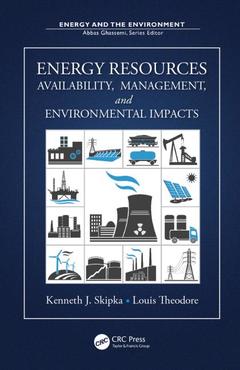Energy Resources Availability, Management, and Environmental Impacts Energy and the Environment Series
Auteurs : Skipka Kenneth J., Theodore Louis

The Energy Problem
Energy Resources: Availability, Management, and Environmental Impacts
The initial chapters offer an overview of energy management, providing an introduction to energy, energy-related engineering principles, regulations, energy conservation, and sustainability. The book discusses all energy resource forms from fossil fuels to renewable resources. The authors introduce an energy matrix providing an analytical structure that quantitatively can be used to evaluate resource options and their impacts.
The concluding chapters provide insight into the driving forces that have shaped energy policy to date and the uncertainties that face future policymakers. The book analyzes various aspects of energy management. It poses concerns and offers solutions, including a proposed approach for developing, organizing, and implementing a national energy plan for the U.S.
A Template for Developing an Energy Policy
- Examines the issues involved with energy management
- Explores the best options for achieving energy independence
- Provides quantitative approaches to energy policy development
- Discusses specific structural and analytical approaches to solving energy management problems
The book considers conservation and the development of new, less expensive energy forms, and the impact these can make in slowing growth in demand while fueling efficiency. It analyzes the availability of traditional energy resources and a method of quantifying their energy, economic, and environmental impacts to provide adequate, inexpensive, long-term energy supplies. It also examines the feasibility of solar power, wind, tidal, geothermal, nuclear, and other less traditional sources of energy.
Section I Basic Principles. Introduction to the Issues. Thermodynamic Principles: Entropy Analysis. Energy Demand. Sustainability and Green Science/Engineering. Energy Regulations. The Modern Energy Matrix: An Overview. Section II Energy Resources: Fossil Fuels. Coal. Oil. Natural Gas. Shale Oil. Tar Sands. Section III Other Energy Resources. Solar Energy. Nuclear Energy. Hydroelectric Energy. Wind Energy. Geothermal Energy. Hydrogen Energy. Biomass Energy. Other Energy Sources. Section IV Aspects of Energy Management. Energy Demand and Distribution Systems. Conservation, Sustainability, and Green Engineering. Environmental Considerations. Economic Considerations. Political Considerations. Challenges Facing Future Energy Policy Makers. Introduction to Energy Policy Issues. Energy–Environmental Interactions. Quantitative Analysis of Energy Management Options. Solving the Energy Management Policy Challenge. Epilogue. Index.
Kenneth Skipka received a BA degree in natural sciences from Long Island University and an MS in meteorology from Cornell University. In 1986 Mr. Skipka, along with three partners, founded RTP Environmental Associates, Inc. (RTP), an environmental consulting firm specializing in air, water, and solid waste issues for a variety of industries, particularly the power industry. He is currently a principal with RTP Environmental Associates, Inc.; owner of the IT Leasing Company; and, a long-standing member of the Air & Waste Management Association (AWMA). He has authored, collaborated on, and/or published numerous books, technical reports, and papers.
Louis Theodore
Date de parution : 04-2014
Ouvrage de 750 p.
15.6x23.4 cm
Thèmes d’Energy Resources :
Mots-clés :
Energy Resources; Energy Policies; Conservation Law for Energy; Energy Sources; Thermodynamic Principles: Entropy Analysis; Energy Conservation; Energy Demand; Power Plant; Sustainability and Green Science/Engineering; Tar Sands; Coal; Overburden; NEA; Energy Systems; Environmental Issues; Ta Ge; Electrical Energy; Oil Shale; Natural Gas; Tar Sand Deposits; Energy Supply Chain; Shale Gas; Heat Exchangers; Doe; Pe Rc; Energy Matrix; Luminescent Solar Concentrators; Diesel Fuel; Energy Independence; Energy Supply



